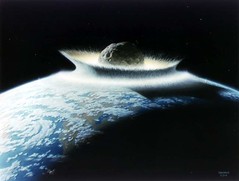"...if natural human reactions to threats interfere, the ending could be far from uplifting. If fear and denial postpone an adequate response, dust and debris could make the daytime sky look like night, the Earth’s surface could be razed by a global firestorm, and tsunamis could obliterate coastal cities.Entire article.
In theory, threats from space may be detected far in advance of their arrival, giving plenty of time to deflect them or at least prepare for the aftermath. But that’s in theory. "What we may actually get," says psychologist Albert Harrison, "is an obsessive focus on a very constricted range of options, a refusal to consider or integrate new data, defensiveness that prevents decision makers from appreciating threats and developing alternatives, and panicky, ineffective last-minute choices."
The result would be devastating. "In some respects," Harrison suggests, "post-impact Earth may resemble an off-world destination: a dangerous place bombarded with harmful forms of radiation, a toxic atmosphere, and little or no useful vegetation." If some part of humanity survives, its future may be bleak. In the case of extreme destruction, Harrison says, "hopes generated by looking forward to emerging from shelter will be overpowered by the realities of living on a dead and barren planet."
Tags: Disasters, Near Earth Objects, Catastrophe, Existential Risks.


No comments:
Post a Comment